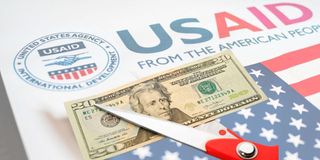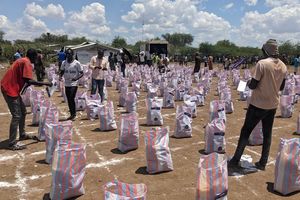How US funding freeze derails Kenya's tracking of disease outbreaks

The management of key diseases in Kenya will be disrupted after the US cut funding for an important health programme, which supports data collection.
Planning and management of key diseases in the country will be disrupted after the United States cut funding for an important health programme, which supports data collection in 90 low and middle income countries, including Kenya.
The health information collection entity, Demographic Health Survey (DHS), which was funded by the US Agency for International Development (USAID), folded about a month ago as a result of President Donald Trump’s foreign aid freeze.
In Kenya, the programme was spearheaded by the Kenya National Bureau of Statistics (KNBS).
A major report published every five years, commonly referred to as the Kenya Demographic Health Survey (KDHS), will be affected should the government fail to find alternative funding.
It provides latest estimates of population and health indicators, which helps the government in planning, implementation, monitoring, and evaluation of population and health-related programmes at the national and county levels.
Since its inception in 1989, Kenya has had seven cycles of Demographic Health Surveys, and the latest data set was released in 2022.
A government report says the abrupt withdrawal of funding will affect systems maintenance and management and it poses major risks for services that heavily rely on data and reporting for critical and continuous informed decision-making.
The services that could be disrupted are the Kenya EMR, which stores electronic medical records for HIV care; CHANJO Ke, which monitors immunisation and vaccine stock levels; DAMU Ke, which has data on blood donations; Kenya Health Information system, which is key for health planning and policy updates; and a HIV data reporting system, which monitors patients adherence and distribution of their drugs.
“Without continued funding, Kenya may struggle to maintain and upgrade these systems independently, leaving the nation vulnerable to disruptions and hindering the transition to locally controlled infrastructure,” shows the impact assessment report.
The government now worries that with the reducing donor support there will be fewer upgrades, maintenance and technology updates on the already existing platforms.
“These systems face the risk of breakdowns, technological obsolescence, and a failure to evolve with emerging health needs,” the report states.
Before the interruption, health personnel and data experts from Kenya received training support from donors to help them interpret complex data systems, which is crucial for policy making.
The assessment report from the government shows that this training gap will likely lead to errors in data reporting and a decline in the overall data integrity.
The government fears that the country may face cyber security attacks on some of the platforms that require regular updates and were previously donor funded.
“Platforms such as KenyaEMR and KHIS2 could become prime targets for cyber-attacks, undermining public trust and disrupting service delivery,” the report shows.
“The funding cut jeopardises the regular updates and protective measures required to secure sensitive health data, leaving these systems exposed to cyber threats and potentially compromising patient confidentiality.”
The report also shows that disease surveillance will be affected, leaving Kenyans exposed to emerging health threats such as infectious diseases and a possible delay in outbreak control and detection, as well as sluggish responses to public health emergencies.
“A withdrawal of funds delays these evaluations, impairing the ability to assess programme effectiveness and make necessary adjustments in real time,” the report indicates.
Since the country does not fully own some of the data systems and some of those are managed by external vendors, the government also says that Kenya will have to incur high licensing fees or migrate to alternative systems, risking data loss and operational delays.





